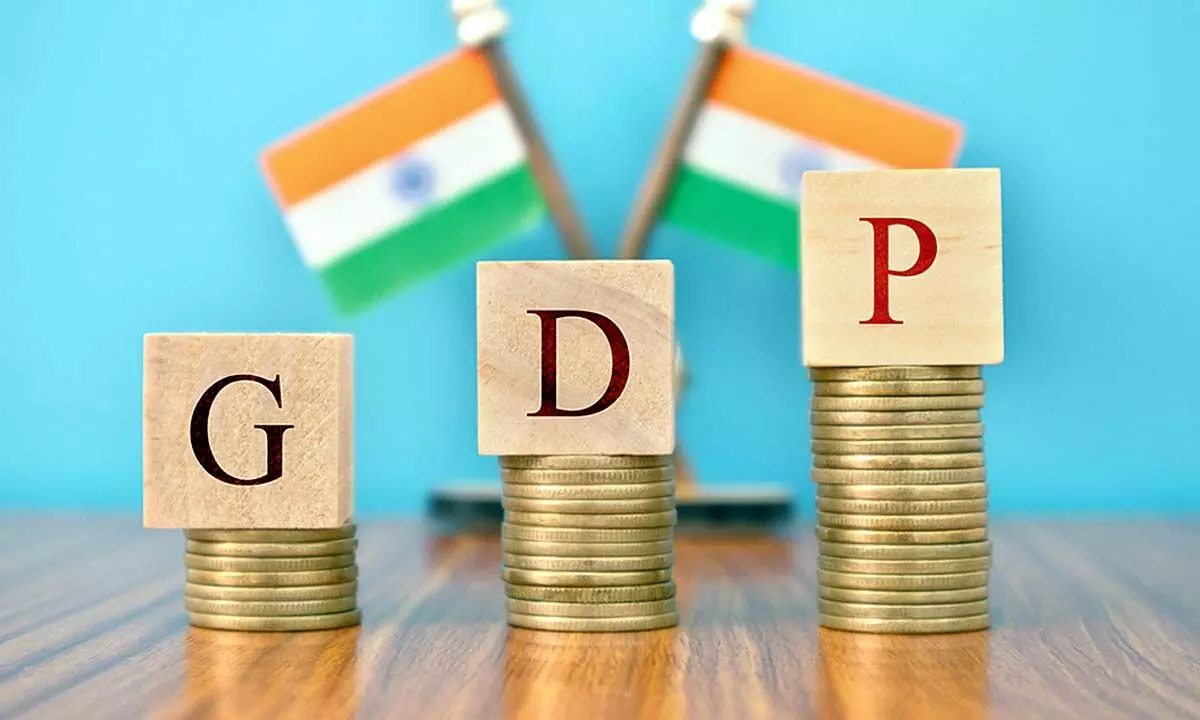What IMF's latest GDP forecast for India tells us
The question is if the reduced forecast is going to be true, are we heading towards recession?
image for illustrative purpose

It appears that the calculations of planners and the Government of India with regard to the performance of the economy have gone wrong. The reason is that the influence of external situation like Russia and Ukraine war, crude oil supplies and high inflation internal to the economy has affected adversely
Gross Domestic Product (GDP) growth rate has been the focus of the government despite its limitations that it may not percolate down or it may not be distributed evenly among all. In fact, the saying in economics 'expectations about expectation may not hold good', is applicable now as the expected GDP growth rate is not going to be achieved. International Monetary Fund cuts the projection of India's economic growth rate to 6.8 per cent instead of 7.4 per cent, while OECD had mentioned that India's GDP growth forecast of 6.9 per cent in FY23 which is lower than RBI's target of 7.0 per cent. Nomura, a brokerage firm says that India's optimism got misplaced and the GDP growth estimate is 7 per cent at par with RBI's revised down forecast and 5.2 per cent for FY 2024.
India's GDP per capita is 86 per cent lower than OECD best performers, inequality is higher than in most advanced economies and more than three fourths of the population is exposed to harmful levels of air pollution in Indian economy. The poorest 20 per cent of the households earn 4.1 per cent of total income in Indian economy depicts that it is highly unequal society. Given the predominance of informal sector which got hit severely during Covid-19, the pandemic situation has reinforced to create jobs in the formal sector, reforms in health care, and more importantly shock responsive social protection to the vulnerable individuals, households and groups. Further, it is important to mention that reducing informality is key to a stronger, more inclusive and resilient growth.
It has been reported that the global economy is experiencing severe challenges influenced by three dominant forces; the Russia-Ukraine war, a cost of living crisis caused by relentless inflation pressures and the slowdown in China due to lockdowns resulting in property sector crisis. As a result, significant slowdowns experienced in largest economies such as US, European Union and China the latter one being influenced by prolonged Covid-19 outbreaks and as a whole it is going to affect many economies adversely. Further, it looks like there is a global recession in 2023 given the slowdown in many countries and the Central banks did little to tame the inflation which is creating havoc with the common people who are already undergoing the heat of it.
The missing link
As per Ministry of Statistics and Programme Implementation (MOSPI) data, while gross value added increased in some sectors such as agriculture, forestry and fishing, electricity, gas and water supply during second quarter of 2022, sectors like mining and quarrying, manufacturing, construction, trade, hotels, transport, communication and services pertaining to broadcasting have registered a decline. While household consumption accelerated and government expenditure improved, gross fixed capital formation that could accelerate economic growth got slowed down and exports rose by 14.7 per cent whereas imports increased at a faster rate i.e., 37.2 per cent resulting in net foreign demand contributed negatively to the growth. Further, OECD mentioned that the softer external demand is a reason behind the India's projected slowdown from 8.7 per cent to 7 per cent in FY23 and it would be around 5.7 per cent in FY24 but it still represents rapid growth in the wake of a weak global economy.
Indian economy has been striving to ensure inclusive recovery from Covid-19 with investments in infrastructure, MSMEs and the social sector. It has shown very good collection of GST every month indicating that the economy is recovering and moving towards a higher growth path. But the international agencies have reduced GDP forecast for Indian economy for, FY23, from 7.5 per cent to 7 per cent and further down to the level of 6.5 per cent cause an alarm and raises several questions as to why the Indian economy is slowing down? Although the RBI has announced that the 'domestic activity remained resilient' it predicted a growth rate of 7 per cent owing to global economic situation, high inflation and tight monetary policy.
It appears that the calculations of planners and the Government of India with regard to the performance of the economy have gone wrong. The reason is that the influence of external situation like Russia and Ukraine war, crude oil supplies and high inflation internal to the economy has affected adversely. Added to it, the foreign reserves have come down by approximately $100 billion is an indication that all is not well. The question is if the reduced forecast is going to be true, are we heading towards recession? Then what steps are needed to be taken up?
Immediate need
Increased investment in different sectors with a focus on employment creation in areas like manufacturing, construction and trade, hotels among others coupled with social sector expenditure would generate demand for the goods and services produced thus leading to the anticipated growth rate. As a matter of fact, manufacturing and construction sectors are lagging behind which can create employment and income need a big push at this juncture. Secondly, as informality influences and leads to increasing inequality pushing many more into poverty, it is important to argue for reducing informality is key to a stronger, more inclusive and resilient growth. Besides, ensuring social protection as a legal right to the poor and vulnerable especially labourers in informal sector a priority that need attention.
(The author is an Independent researcher based in Hyderabad)

